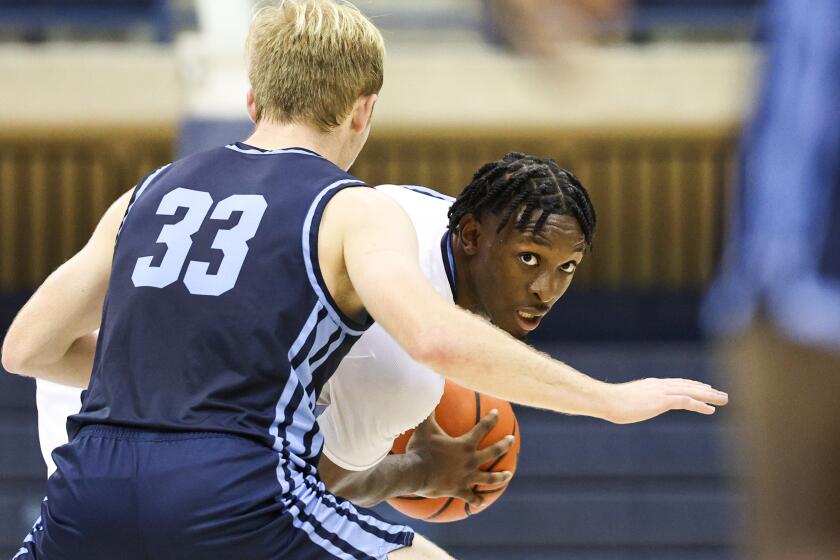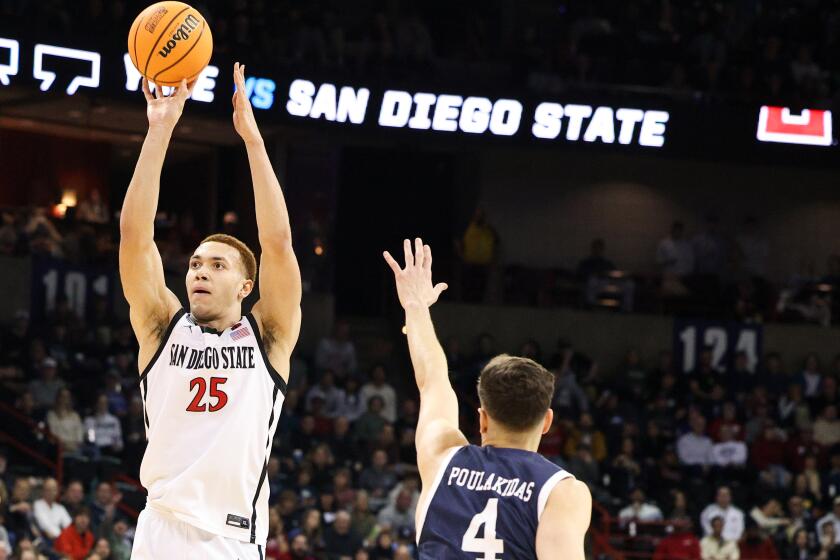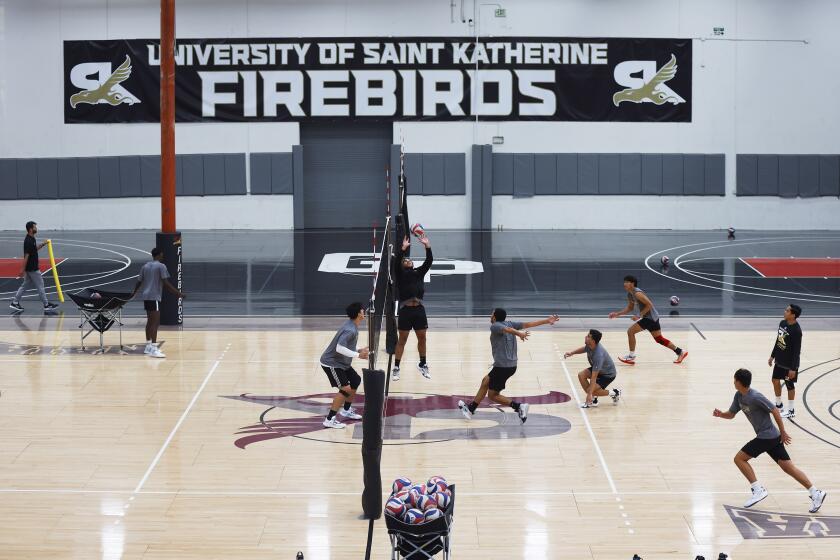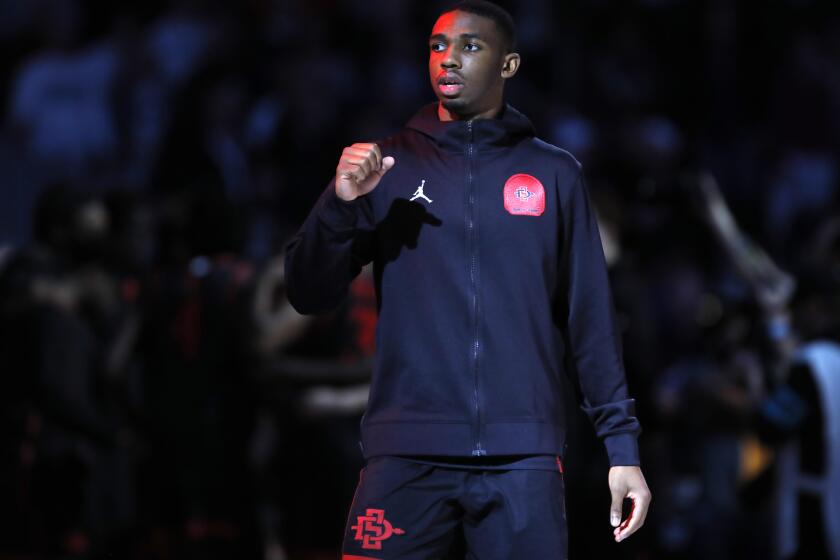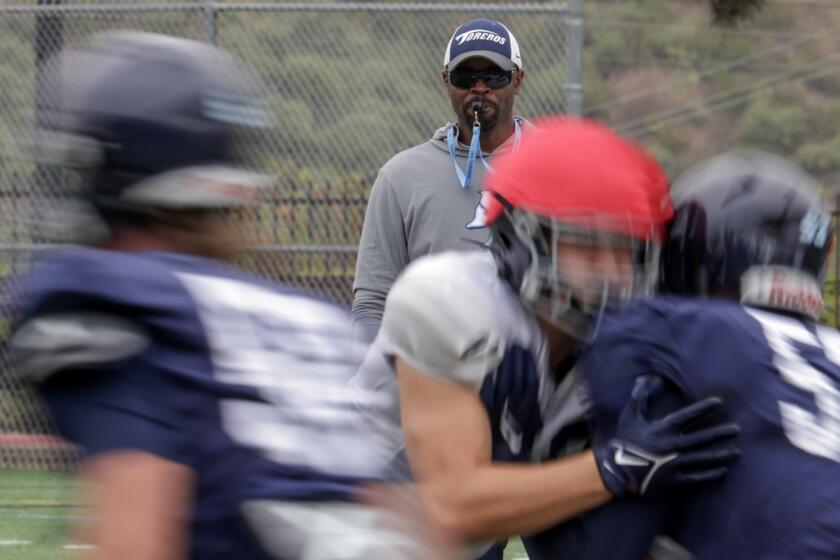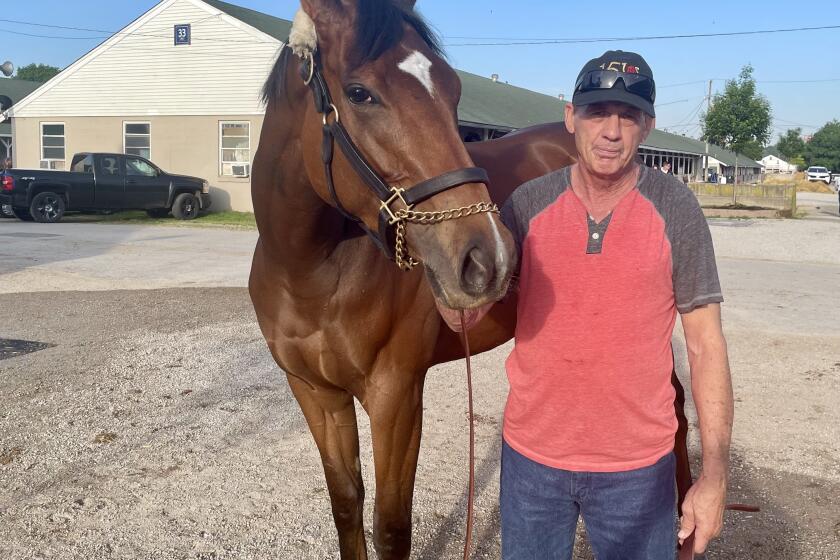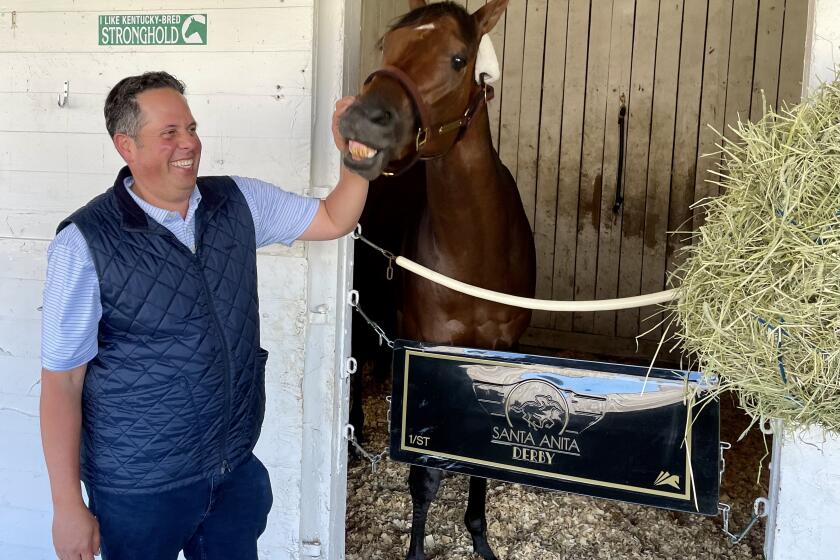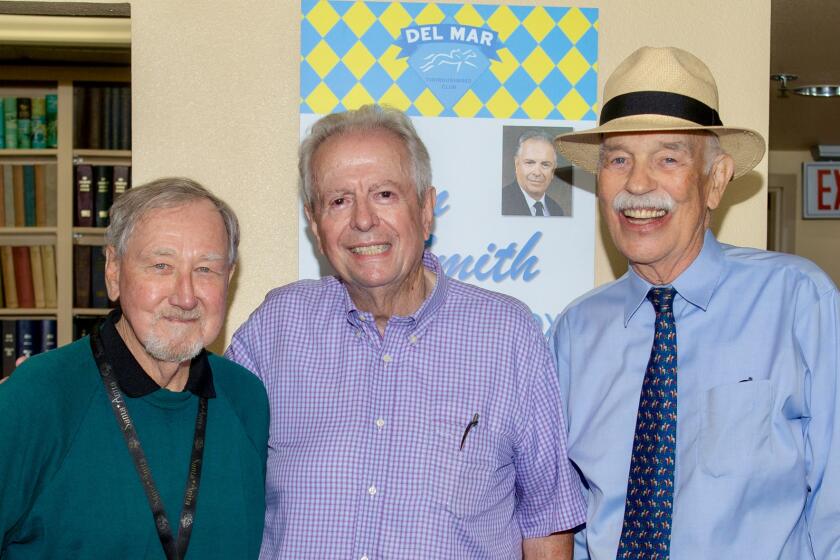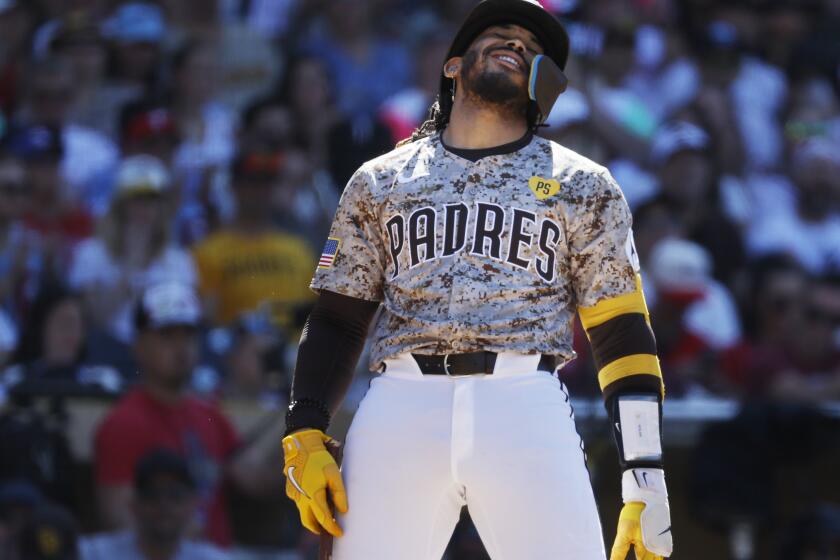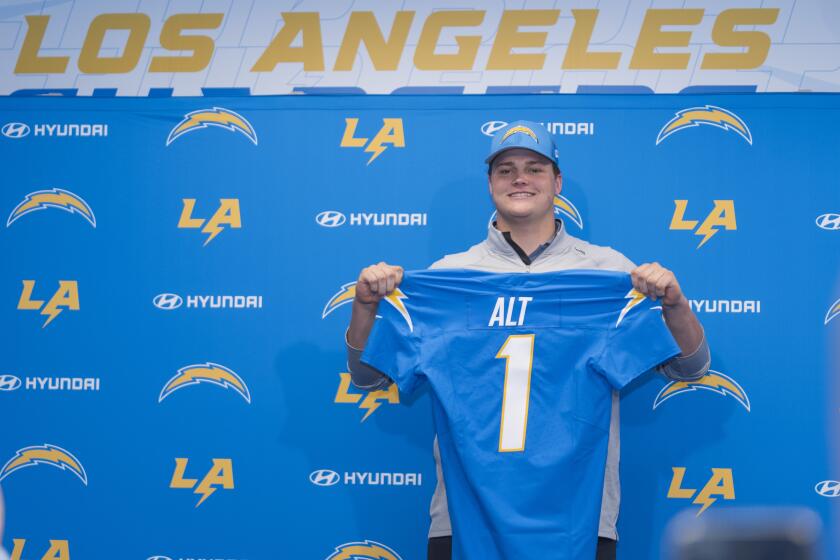Column: Did DK Metcalf show how hard track is, or how far it has fallen?
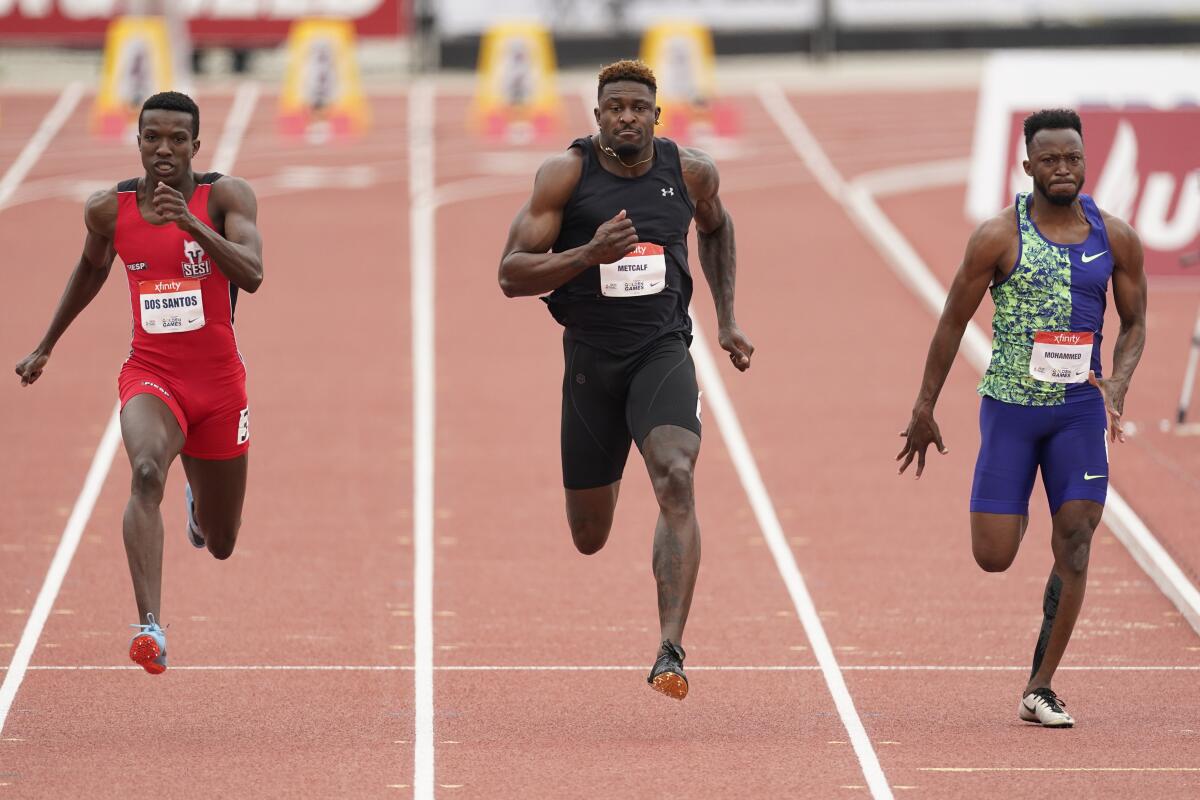
Seahawks receiver finishes last in his 100-meter prelim on a record-breaking day at Mt. SAC
DK Metcalf wears a blue, green and silver uniform on Sundays for the Seattle Seahawks.
On this Sunday, he was in all black. Black shorts. Black tank top. Black track spikes.
He dressed like the villain. But was he?
Metcalf’s presence at USA Track & Field’s Golden Games on Sunday was either a good or bad thing for an ailing sport, a rope lowered into the morass or the latest gauge of the depths to which it has sunk, an infusion of interest or a publicity stunt that smacked of desperation at what otherwise was probably the best track meet in Southern California in more than a decade.
He ran the 100 meters against a good but hardly great collection of mostly American sprinters, a football player who made a wrong turn and ended up at a track meet. The result was predictable, even for a Pro Bowl receiver who so famously chased down a speedy defensive back with 10-yard head start last October on “Sunday Night Football.”
Metcalf was in the second of two preliminary heats at Mt. San Antonio College’s renovated (and fanless) Hilmer Lodge Stadium. There were nine men in it. He finished ninth at 10.37 seconds despite a fast track and friendly tailwind.
He did run faster than two guys in the other heat, although, to be fair, their tailwind wasn’t as brisk.
“These are world-class athletes,” Metcalf said afterward. “They do this for a living. It’s very different from football speed, from what I realized.”
And that was in a prelim against a ho-hum field just doing enough to advance while saving something for the final 2½ hours later that Mt. SAC alum Cravon Gillespie won in 9.96 seconds.
More perspective: According to the all-time list compiled by the IAAF, the sport’s world governing body, 3,078 men have gone faster than 10.37 over 100 meters with a legal tailwind.
“Because I was out here doesn’t mean I disrespect any other athlete or sport,” Metcalf said. “I just respect myself and what I can do. Personally, it was a good experience. Anybody else who has a different opinion, you’re entitled to your own opinion. I think I did very well for myself.”
The bigger question swirling around the pristine stadium, though, was whether track did well for itself Sunday. Whether he attracted or detracted attention.
“I agree (Metcalf) competing in the meet will draw needed attention to the sport,” former 200 and 400 world-record holder Michael Johnson tweeted, “but NFL, NBA, tennis, and golf don’t need athletes from other sports for them to draw attention. The best sprinters in the world should be enough. Track and Field, market your own product!”
As Metcalf walked down the backstretch and unpinned his racing bib, his day done before the NBC telecast came on air, the women’s 100-meter hurdlers were on the opposite side of the track. The field featured the world-record holder and seven Olympic or World Championship medalists.
The sideshow had ended. The real meet could begin.
World-record holder Keni Harrison would win in 12.48 seconds. If Metcalf’s struggles didn’t illustrate how hard this sport is, how elite these athletes are, consider Devynne Charlton set a national record for the Bahamas at 12.61 seconds … and finished fourth. Or Sydney McLaughlin, the second fastest woman ever in the 400 hurdles, ran a personal-best 12.65 seconds … and was fifth.
In the men’s 800, 2016 Olympic bronze medalist Clayton Murphy was third — and that was after Donavan Brazier, the reigning world champion, pulled out earlier in the week with a foot injury.
In the women’s 800, two people went under 2 minutes. And that was the B final. In the A final, seven more did.
In the women’s 100, eight-time Olympic medalist Veronica Campbell Brown of Jamaica finished fifth. English Gardner, a two-time NCAA champion and member of the victorious 4x100 relay team at the 2016 Olympics, was a distant eighth — .73 seconds behind winner Sha’Carri Richardson’s blazing 10.77 into a stiff headwind that broke the stadium record set by nine-time Olympic medalist Merlene Ottey.
In the women’s 200, Allyson Felix, the most decorated U.S. female athlete in Olympic history, got beat by Harvard alum Gabby Thomas.
In the men’s 200, Noah Lyles needed a late surge to beat Kenny Bednarek in 19.90 seconds at a distance where only three men in history have gone faster.
In all, there were world-leading marks for 2021 in four events. And 15 stadium records fell at a venue that annually hosted the biggest names in the sport — Carl Lewis, Marion Jones, Jackie Joyner-Kersee, Florence Griffith-Joyner, Al Oerter — before it underwent an $83.5 million facelift starting in 2017. This was the first full meet since.
“Such a beautiful track like this, it’s just fun to come out and just be in the sun,” said American pole vaulter Christopher Nilsen, who whose 19 feet, 4¾ inches is best in the world this year and a stadium record. “The goal of pole vault is the same goal we share with the rest of the track and field events. We just want to grow the sport.
“It’s huge over in Europe and it’s growing in Asia, and we just want to keep growing it more in the United States. There’s such an emphasis on football, basketball, soccer, and rightfully so. But I want to be able to say that track and field is just as much up there in popularity as those. We can get out here and show … that we’re good at what we do and we love it, and they’ll get on board.”
Maybe Metcalf brought more TV eyeballs to the meet. Maybe more people got on board. Or maybe the mere fact that he was the focus — in many cases, the sole focus — of the pre-meet media coverage is the latest indication that a once robust sport can no longer stand on its own. That the casual sports fan couldn’t tell you Rai Benjamin is the third fastest 400-meter hurdler in history.
Athletes were asked to state their name at the virtual interview area. “Rai Benjamin,” he said into the camera after his 47.14 shattered the stadium record set by legendary Edwin Moses in 1979. “Not Ray, not Raj. Rai.”
It won’t get much better this summer, even if the delayed Tokyo Olympics are somehow held in a country where only 2 percent of the population is vaccinated for COVID-19. Just like it did the last time the Summer Games were in Asia, in Beijing in 2008, NBC opted to move swimming to the morning in Tokyo so it can be aired live in prime time in the States. It tellingly left track at night — oh dark thirty on the other side of the Pacific.
It’s a proud, pure sport with diehard followers that deserves better from mainstream America, that deserves better than a guy with the 3,079th fastest 100-meter time stealing the spotlight.
Metcalf, who fell well short of his goal of logging a qualifying time for next month’s Olympic Trials, was asked what’s next for him.
“Get back to football,” he said without hesitation. “It’s time for minicamp.”
Sign up for U-T Sports daily newsletter
The latest Padres, Chargers and Aztecs headlines along with the other top San Diego sports stories every morning.
You may occasionally receive promotional content from the San Diego Union-Tribune.

